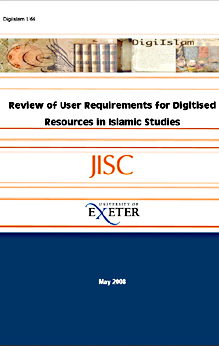
Publisher: University of Exeter & JISC (Joint Information Systems Committee)
Release Date: May 2008
Pages: 66
Source: https://projects.exeter.ac.uk/digiIslam/documents/DigiIslamReport.pdf
The University of Exeter with its Institute of Arab and Islamic Studies and an Arab World Documentation Unit is among the country’s leading academic centres in its field, achieving a top grade in the last assessment conducted by the Higher Education Funding Council (2001). The resources available include a collection of over 100,000 volumes on Arabic, Islamic and Middle Eastern Studies and a team of committed and knowledgeable librarians. The subject librarian for Middle East and Islamic studies, Paul Auchterlonie and his colleague Ahmed Abu Zayed have led the way on issues relating to access to digitised Islamic resources, with the university on-line catalogue allowing searches using Arabic script. Dr Ataullah Siddiqui’s report, ‘Islam at Universities in England – meeting the needs and investing in the future’ (June 2007) noted that “Islamic Studies courses currently being offered at universities in England should adopt a greater focus on theological and civilisational aspects of Islam which are relevant to practicising Muslims”, thus placing an onus on both academics and support staff at institutions like Exeter to cast the net more eclectically and widely.
This report on user requirements for digitised resources in Islamic studies is a logical starting point in responding to challenges posed by Dr Siddiqui and also recent web developments – user requirements must precede the development of solutions. Funded by JISC, a team at the University of Exeter have attempted “to landscape existing digitised resources for Islamic Studies; to identify gaps in the provision of digitised resources in Islamic studies; to establish criteria to prioritise the potential materials and/or collections for digitisation”. The resulting 66-page report thus provides a ‘state of the art’ view of what exists now, likely future developments and includes a number of invaluable appendices: ‘Survey of reading lists and high use books in Islamic studies in UK universities’ (Hourani, Esposito and Hodgson amongst the top); a ‘Survey of recent doctoral dissertations (1997-2006) in Islamic studies in UK and Irish universities’ (in the last ten years, 97 institutions have awarded 860 PhD theses); and a ‘Survey of existing portals for Islamic studies, libraries of online primary texts, online manuscript catalogues and Islamic digitisation projects’.
